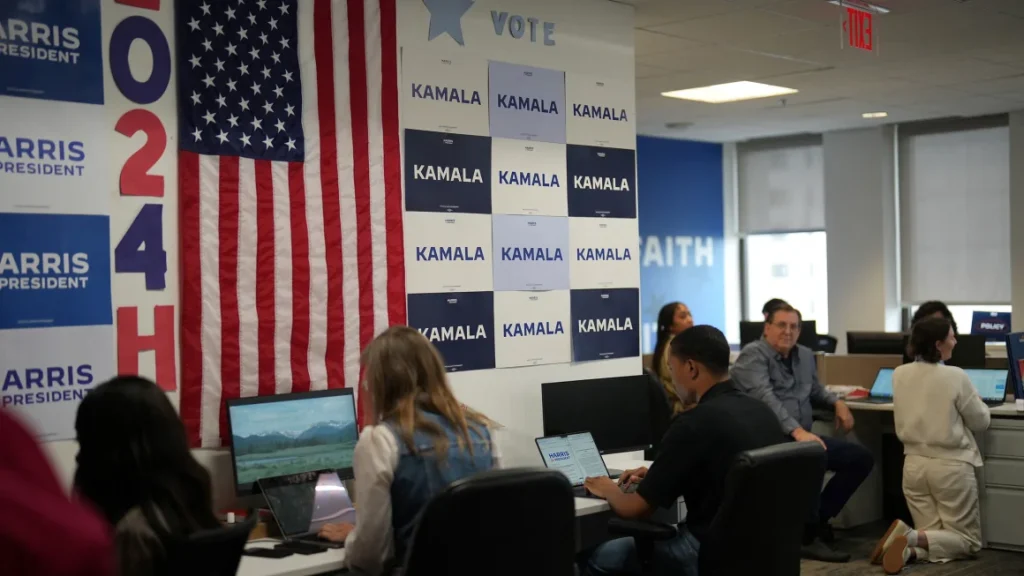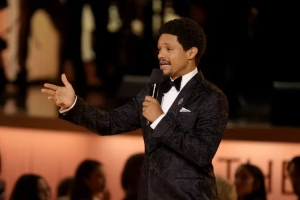Fact check: Harris campaign social media account has repeatedly deceived with misleading edits and captions

A social media account run by Vice President Kamala Harris’ campaign has been repeatedly deceptive.
The @KamalaHQ account, which has more than 1.3 million followers on the X social media platform formerly known as Twitter, has made a habit of misleadingly clipping and inaccurately captioning video clips to attack former President Donald Trump.
The Harris campaign deploys @KamalaHQ as a kind of irreverent attack dog, using jocular posts to draw attention to controversial, incorrect, or dubious comments by Trump and his allies. But the account, which the Harris campaign calls its “official rapid response page,” has itself made inaccurate comments on multiple occasions.
Below are eight examples of false or misleading video posts from the account since mid-August, including three from the latter part of this week. All of them have previously been highlighted by an anonymous rebuttal account called @KamalaHQLies, which itself has more than 268,000 followers.
Misleadingly describing a Trump comment about his supporters
An August 17 post from @KamalaHQ strongly suggested Trump had gotten confused about what state he was in during an event in Wilkes-Barre, Pennsylvania. The post said, “Trump: Would that be okay, North Carolina? (He is in Pennsylvania).” It included a six-second video clip in which Trump said, while pointing to his left, “Would that be okay, North Carolina? I don’t think so, right.”
Misleadingly describing a Trump comment about his supporters
An August 17 post from @KamalaHQ strongly suggested Trump had gotten confused about what state he was in during an event in Wilkes-Barre, Pennsylvania. The post said, “Trump: Would that be okay, North Carolina? (He is in Pennsylvania).” It included a six-second video clip in which Trump said, while pointing to his left, “Would that be okay, North Carolina? I don’t think so, right.”
The Harris campaign was explicit about its intentions in the version of the post it made on the Instagram @KamalaHQ account, saying, “Donald Trump is lost and confused.”
But Trump was not lost or confused.
The full video of the rally shows that earlier in the speech, Trump had pointed to the same spot on his left to acknowledge and then speak to a group of ardent supporters from North Carolina, eventually saying, “Thank you very much. North Carolina!” Later, in the moment shown by @KamalaHQ, he pointed to these supporters again and referred to them as “North Carolina.” He had not forgotten he was speaking in Pennsylvania.
The Harris campaign declined to comment on this @KamalaHQ post.
Deceptively clipping and misleadingly describing a Trump comment about immigration
On Thursday, the @KamalaHQ account made a new attempt to suggest that Trump was confused about his location. Its post said, “Trump: ‘Pennsylvania, remember this when you have to go to vote’ (He is in Arizona).” It included an eight-second clip of Trump saying in a Tucson speech, “So Pennsylvania, remember this when you have to go to vote, okay, just remember this: 2,000% increase. This is a small —…”
The Instagram post of this remark, too, was more explicit than the X post; on Instagram, the Harris campaign added text over top the video that read, “Trump forgets which state he is in (again).”
But Trump, again, had not forgotten which state he was in.
The extended footage shows that the Harris campaign clipped out critical context: Trump was talking about immigration, a key topic in Arizona, and had just read a part of his prepared text about how a small Pennsylvania town has “experienced a 2,000% increase in the population of Haitian migrants under Kamala Harris.” He then added, “So Pennsylvania, remember this when you have to go to vote, okay, just remember this: 2,000% increase, this is a small town; of all a sudden they got thousands of people.”
One could try to argue it’s odd for Trump to make a direct appeal to Pennsylvanians while speaking in Arizona. But Trump’s remarks anywhere in the country are broadcast to voters everywhere in the country, and, regardless, @KamalaHQ eliminated the context that would allow people to develop an informed opinion on this remark.
The Harris campaign declined to comment on this @KamalaHQ post.
Deceptively clipping and misleadingly describing a Trump comment about his 2017 Charlottesville remark
A Friday post from @KamalaHQ said, “Trump says ‘nothing was done wrong’ in Charlottesville in 2017 when neo-Nazis chanted ‘Jews will not replace us’ and killed an innocent woman.” The post included a 10-second clip of Trump telling reporters at a Friday event in California, “…like on Project 2025, I have no idea about — had nothing to do with me, he didn’t correct her, he knew that. Charlottesville — nothing was done wrong.”
But the full video of Trump’s California comments shows that the Harris campaign deceptively cut the clip right before Trump made clear he was not claiming that neo-Nazis in Charlottesville did nothing wrong or that the murder of innocent Charlottesville counterprotester Heather Heyer was not wrong.
Rather, the full video shows, he was arguing that he did nothing wrong with his “very fine people, on both sides” comment in 2017 about the events in Charlottesville, which he has repeatedly insisted was not about white nationalists.
Specifically, Trump was complaining that a moderator of the presidential debate on Tuesday, David Muir of ABC News, did not challenge how Harris described Trump’s 2017 comments. We say Harris’ debate description of the 2017 comments was fair, but regardless, Trump was not defending murder on Friday.
Here is Trump’s full Friday remark, in which he invoked various Fox News hosts: “I think he (Muir) corrected me 11 times. Of the 11 times, I don’t think he had the right to correct me at all. Didn’t correct her once. Like on Project 2025, I have no idea about — had nothing to do with me, he didn’t correct her, he knew that. Charlottesville — nothing was done wrong. All you had to do is read my statement one more sentence and you would’ve seen that. Sean Hannity, Laura Ingraham, Jesse (Watters), all of them, they — Greg Gutfeld — they all took that and they corrected it many times. But they keep coming with the same lies.”
Defending the @KamalaHQ post, the Harris campaign said in an email: “He’s saying he did ‘nothing wrong’ in relation to him saying ‘very fine people’ who did what is described in the tweet.”
There are two problems with this. The post itself did not acknowledge that Trump’s “nothing wrong” comment was about his own previous remark. And while there’s a solid case that this 2017 “very fine people” comment was about some white nationalists, there’s no basis for claiming it was about Heyer’s murderer in particular — much less that Trump’s “nothing wrong” comment on Friday was about this murderer.
Deceptively clipping and inaccurately quoting a JD Vance quote about veterans’ health care
On Thursday, the @KamalaHQ account posted a nine-second video clip of Sen. JD Vance, Trump’s running mate, speaking in an interview. The account wrote: “Q: Would you consider privatizing veterans health care? Vance: I think I’d consider it.”
But Vance did not actually say “I think I’d consider it.” A close listen to the clip reveals Vance actually said “I think I’d consider — and…” And because @KamalaHQ clipped out the critical comments he made after the “and,” the Harris campaign didn’t allow people to immediately learn just what Vance said he would consider.
The extended Vance quote shows he said he would consider giving veterans greater flexibility to use private health care but that he does not want to eliminate federal health care provided by the Department of Veterans Affairs (VA). A public-private combination for veterans’ care was the general approach taken by President Barack Obama and then by Trump; it’s certainly not without critics, but it’s much less contentious than the idea of a total privatization.
Here’s the full Vance quote:
“I think I’d consider — and Donald Trump was really good at this, doesn’t get enough credit for this particular innovation — giving veterans more choice. Right? So let’s say you’re in a rural hospital. Your closest VA is 120 miles away. Why force a veteran to drive two-and-a-half hours to that VA facility when he can get cheaper and good care right in his backyard? Right? So I do think that we ought to open up choice and optionality for veterans. You know, I think that there is areas where the VA actually works very well, so I wouldn’t say get rid of the whole thing. I would say give people more choice, I think you’ll save money in the process, you’ll also give veterans a lot more optionality.”
The Harris campaign defended the @KamalaHQ post. It argued in its email, “Vance is suggesting he would consider privatizing VA functions. This is not misleading. Our caption does not say ‘the whole VA health system.’”
But the Harris campaign did not address the caption’s “consider it” misquote or explain why it cut the clip before people could hear Vance explain what he would “consider.” And if the Harris campaign wanted to claim Vance was talking about possibly privatizing certain VA “functions,” as it said in the email, it could have said that in the post rather than at very least leaving open the impression he was talking about privatizing the whole VA.
Vance spokesperson William Martin said the Harris campaign is “lying” about what Vance said. Martin said Vance “personally relied on the VA for years after leaving the Marine Corps,” that Vance does not even want to privatize VA “functions,” and that giving veterans more options to voluntarily choose private care cannot be fairly described as privatizing even parts of the VA. Martin said: “In the full exchange, Senator Vance clearly says he would not privatize the Department of Veterans Affairs.”
Deceptively clipping and falsely describing a Trump quote about penalties for damaging monuments
The @KamalaHQ account frequently invokes Project 2025, the Heritage Foundation think tank’s right-wing policy proposals for the next Republican administration. Project 2025 is not Trump’s initiative, and he has said he disagrees with some of its proposals, but he has extensive ties to the initiative; you can read more here.
An August 30 post from @KamalaHQ said, “Trump says he plans to bring back laws from 100+ years ago, echoing Project 2025: ‘We don’t pass laws like that. They are tough.’” The post included a seven-second clip of Trump speaking at a rally in Pennsylvania.
But the full video of the rally shows Trump was not even talking about Project 2025 or his future plans.
Rather, Trump was telling his usual tale about how he supposedly “signed” a century-old law to give automatic 10-year prison sentences to people who were damaging monuments. Trump’s story is false — he didn’t actually sign any law on monument-damage penalties or impose automatic 10-year sentences — but it’s also false that he was “echoing Project 2025” or announcing some plan for a next Trump administration.
The Harris campaign defended this @KamalaHQ post by arguing that “Trump’s entire platform is about embracing ‘tough’ policy of the past” on various subjects.
That’s another thin defense. The post made a specific claim about what Trump was supposedly saying in a specific video included in the post, and Trump wasn’t actually saying that.
Deceptively clipping and misleadingly describing a Trump comment about taxes
A September 5 post from @KamalaHQ said, “Trump tells his wealthy donors he is going to make his tax handouts for the ultra-wealthy ‘permanent’ and cut their taxes ‘even more.’” It included a 13-second clip of Trump saying, “The fifth pillar of my plan is to make the Trump tax cuts permanent — they are massive tax cuts, biggest ever, permanent — and to cut taxes even more.”
But the full video of the speech shows the @KamalaHQ post cut the video clip right before Trump elaborated on what he meant by cutting taxes “even more.” The first two policies he mentioned were eliminating taxes on tips and eliminating taxes on Social Security benefits — policies that, whatever their merits or flaws, would certainly benefit people who are not wealthy. (So did his 2017 tax cuts, which produced gains on average for people of all income levels although the wealthy gained most.)
Also, this was not a speech to wealthy Trump donors alone. It was a speech to the nonpartisan Economic Club of New York, whose members include a broad array of business executives from the area; some attendees were wealthy Trump donors, but others were not. The very next day, the Harris campaign used the @KamalaHQ account to tout her own popularity among chief executives.
The Harris campaign defended the post in question in part by noting that wealthy Trump donors were in attendance and in part by saying that one of the biggest policy announcements Trump made in speech was that he plans to try to lower the corporate tax rate from 21% to 15% (a reduction Trump said would be “solely for companies that make their product in America”). The Harris campaign said that “no tax on tips and Social Security were not new.”
New or not, though, the @KamalaHQ clip clipped out those important words — making Trump’s comments on tax cuts sound more focused on the wealthy than they were.
Cutting out critical words from a Vance comment about unions
An August 29 post from @KamalaHQ said, “Vance: Democrats want to attack Republicans as being anti-union and sometimes the shoe fits.” It included a five-second clip of Vance saying those words.
But the full video of Vance’s speech to the International Association of Fire Fighters union shows that the Harris account clipped out the critical remark Vance made next, arguably in the very same sentence. His full comment: “A lot of Democrats want to attack Republicans as being anti-union and sometimes the shoe fits — but not me, and not Donald Trump.” He went on to outline actions he had taken to support firefighters.
The Harris campaign said that this @KamalaHQ post was a “direct quote of JD Vance”; the campaign said the post is “clearly meant to convey that Vance acknowledges Republicans have a history of being anti-union.” But even “direct” quotes can be made misleading if they exclude the contextualizing words that came before or after the quote.
If, for example, movie critic Sally Smith wrote, “This director has a long history of making great films, but this one is awful,” it would be a “direct” quote if an ad for the new movie said, “Smith: ‘This director has a long history of making great films.’” But that would also be deceptive.
Falsely describing a comment from a Trump ally
An August 28 post from @KamalaHQ said: “Trump operative on Project 2025: If you have principles without power, it’s meaningless. We must wield power. We must seize power.” The post included a 12-second clip of far-right activist and Trump ally Jack Posobiec saying in an interview, “Now if you have all power and no principle you’re a tyrant. But if you have principles without power, it’s meaningless, it’s completely meaningless. You must wield power. You must seize power.”
But as Posobiec accurately noted in response to the @KamalaHQ post, he never even mentioned Project 2025 in these comments. The words Project 2025 do not appear at all in a transcript of the full interview.
The Harris campaign defended the @KamalaHQ post with a confusing stretch — claiming Posobiec’s comment is “part of” a “larger” Trump-Project 2025 agenda to fire civil servants who are not seen as Trump loyalists. Posobiec wasn’t talking here about firing civil servants, and, regardless, the post made a specific claim that Posobiec was talking about Project 2025, which he was not.


